The image of the modern journalist is that of the truth-seeker, someone who stands up to those in power with integrity and holds them accountable to the public. The free and honest press is a democratic institution many Americans pride themselves on, but it wasn’t always this way. At the turn of the 19th century, news media, like most spheres of American life, had been consolidated into the hands of a few powerful and profit-minded individuals, namely Joseph Pulitzer and William Randolph Hearst. The practice of “yellow journalism,” or sensational news reportage, had become standard, as outlets aimed to sell more papers, rather than tell the truth.
At the same time, America was more in need of the truth than ever, with a greater number of working Americans suffering under the weight of the powerful few that dominated politics, business, and daily life. Poverty, political corruption, wealth inequality, and racism went unchecked by the government, the main concern of which was allowing American industry to expand as much as possible.
Enter the muckrakers: a group of journalists who made it their mission to bring the dark side of the Gilded Age to light. Armed with pens, typewriters, and raw courage, journalists like Ida M. Tarbell, Upton Sinclair, Jacob Riis and Ida B. Wells took it upon themselves to expose injustice wherever they saw it, helping usher in a new Progressive Era of social reform and inspiring future generations of reporters to do the same. The role of the journalist was no longer to simply report, but expose—a mantle journalists continue to take up today.
In an era when small publications are folding at an alarming rate and news media is once again consolidating into the hands of a few powerful corporations, the disruptive independent journalism of the muckrakers is a powerful reminder of the importance of a free and fearless press.
Here are 10 books to get you inspired by these groundbreaking journalists.
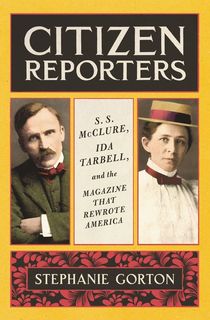
Citizen Reporters
In the mid-1890s, publisher Samuel McClure and journalist Ida M. Tarbell joined forces to establish one of the most influential magazines in the nation’s history. Over the course of its nearly 40-year run, McClure’s Magazine attracted over 400,000 readers and exposed corruption and injustice everywhere from the local government to national corporations to factories. Along with Tarbell and McClure, the magazine’s scrappy, dauntless band of crusaders included reporters Ray Stannard Baker and Lincoln Steffens.
Together, they established investigative journalism’s vital role in democracy, earning the ire of powerful politicians and businessmen alike. In a narrative that is as entertaining as it is informative, Citizen Reporters documents the astounding rise and fall of a groundbreaking American media institution.
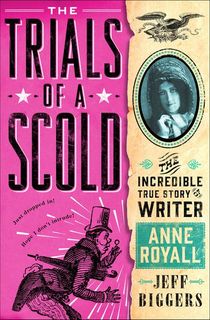
The Trials of a Scold
Although you likely haven’t heard of her, Anne Royall was a trailblazer in the field of journalism. She was one of America’s first female muckraking journalists, the first woman granted a presidential interview, and, in 1829, the first North American legally convicted as a “common scold” for her scathing social criticism, particularly that of the minimizing separation between church and state.
Though her journalistic activity predates the Progressive Era by several decades, her fierce commitment to exposing corruption and speaking truth to power earns her a well-deserved spot among the muckrakers. In this thoroughly-researched and vibrant biography, American Book Award-winning author Jeff Bigger shines a long-overdue spotlight on Royall’s remarkable life and work.
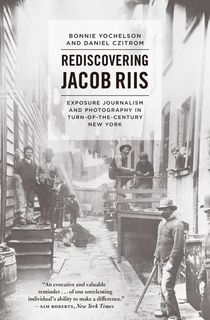
Rediscovering Jacob Riis
For many people, the name of Jacob Riis is synonymous with muckraking in New York in the Progressive Era. His 1890 photojournalism publication How the Other Half Lives exposed the squalid living and working conditions of people in the city’s tenement houses, sparking national public outcry and remembered more than a century later as a quintessential piece of muckraking journalism.
Rediscovering Jacob Riis revisits the writer’s life and career, from his early life as a Danish immigrant and itinerant laborer struggling to make ends meet to his later reporting and activism in the context of Gilded Age New York. The book gives as much weight to Riis’s photojournalism as it does to his written reportage, emphasizing his seminal role in harnessing the powers of photography to spark social change. In this renewed era of rampant wealth inequality, Rediscovering Jacob Riis invites readers to look to the past for clues about how to fight for a better future.
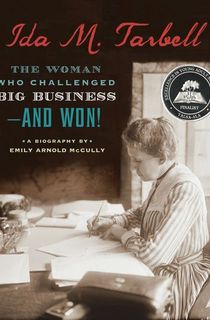
Ida M. Tarbell
One of the most famous muckrakers of the 19th century, Ida M. Tarbell didn’t always intend to go into journalism—she was the only woman to graduate in biology from her Pennsylvania college, but found the professional field essentially closed to women. Tarbell never lost her hunger for the truth, though, and eventually came to channel her eye for fact-seeking into exposing the corruption of America’s central corporations at the height of their powers.
In this well-researched yet accessible biography, a YALSA-ALA Finalist for Excellence in Young Adult Nonfiction, Emily Arnold McCully offers readers a detailed account of the remarkable woman whose was born in Pennsylvania oil country and went on to challenge Standard Oil.

The History of the Standard Oil Company
Few pieces of investigative reportage can be said to have been more influential or successful in accomplishing their goals than Ida M. Tarbell’s The History of the Standard Oil Company. Originally published as a series of installments in McClure’s Magazine, Tarbell’s 19-part exposé on the mechanisms of Standard Oil’s monopolistic control of America’s oil supply was published in full in 1904. By 1911, John D. Rockefeller’s unassailable business empire was dismantled under the Sherman Antitrust Act.
The remarkable impact of Tarbell’s work inspired scores of investigative journalists to follow in her footsteps, exposing corporate greed, corruption, and consolidation. Tarbell’s success is a testament to the power of a single voice and the necessity of using it.
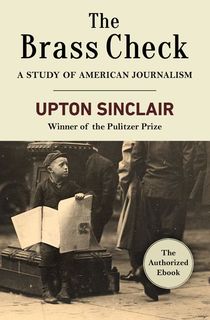
The Brass Check
Many people know Upton Sinclair for his 1906 novel The Jungle, a fictionalized but accurate account of immigrants working in sordid conditions at a Chicago meat-packing plant. Though The Jungle is perhaps his most influential and well-remembered work, eventually leading to the establishment of the FDA, Sinclair, an outspoken Socialist, published an abundance of other influential investigative journalism focused on the severe oppression of American laborers and the unchecked corruption that plagued local and national government.
In The Brass Check, Sinclair condemns contemporary mass media for its unwillingness to speak truth to power, comparing mainstream, sensationalist news outlets to brothels where writers and editors sacrificed truth and integrity in order to serve the economic interests of monopolistic publishing giants like William Randolph Hearst. Sinclair provides specific instances of when the truth was twisted or altogether sacrificed at the altar of wealth and power, such as the Ludlow Massacre of 1914 and the Red Scare stirred up by Hearst’s New York Journal. This scathing exposé, which Sinclair considered to be his most dangerous, is as relevant now as it ever was.
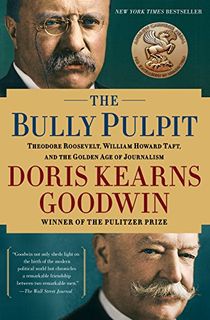
The Bully Pulpit: Theodore Roosevelt, William Howard Taft, and the Golden Age of Journalism
More than a mere history of muckraking journalists, The Bully Pulpit puts the muckrakers of the Progressive Era in the context of the divisive 1912 presidential election, which saw the establishment of Theodore Roosevelt’s progressive Bull Moose Party after he lost the Republican primary to incumbent William Howard Taft. It describes how the muckrakers, represented in the book by the writers of McClure’s Magazine, magnified working-class grievances and aroused the national spirit of reform that allowed Roosevelt to change the government’s laissez-faire attitude toward robber barons, corrupt politicians, and corporate exploiters of the nation’s natural resources.
Drawing from extensive repositories of letters exchanged among the reporters of McClure’s Magazine, and between Theodore Roosevelt and William H. Taft, The Bully Pulpit is the story of two friendships: that of the muckrakers as they coalesced to usher in a new era of social reform in America, and that of Roosevelt and Taft, whose alliance would not survive it.

Ten Days in a Mad-House
Though she started her career with no formal journalistic training, by age 26, Nellie Bly had made a name for herself as one of the most adventurous and fearless investigative journalists of her time. Originally published in Joseph Pulitzer’s The New York World in 1887, Ten Days in a Mad-House is an explosive early piece of immersive journalism documenting Bly’s experience at the Blackwell Island asylum for the mentally ill.
While undercover as a patient at the asylum, Bly encountered brutal conditions for the patients, who were fed rotten food, abused by a callous staff, and misdiagnosed and mistreated by doctors who were supposed to help them. In many cases, Bly saw sane people driven to madness by the brutality of their forced internment on the island.
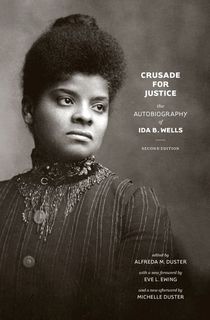
Crusade for Justice
This book is the powerful autobiography of Ida B. Wells, a journalist, civil rights activist, educator, and co-founder of the NAACP. Born into slavery in Mississippi in 1862, Wells experienced first-hand the horrors of systematic racism in postbellum America. In Crusade for Justice, Wells describes with passion and frankness her lifelong fight for racial and gender equality, working alongside figures like W. E. B. Du Bois, Madam C. J. Walker, Mary Church Terrell, Frederick Douglass, and Susan B. Anthony.
Wells was known for her investigative journalism that exposed the cruel reality of Black Americans in the late 19th and early 20th centuries, providing particularly damning accounts of American lynching and traveling abroad to Great Britain to garner sympathy for the cause when her work could not gain traction in the United States. In addition to her work as a journalist, Wells was an outspoken suffragist for both women and African Americans, founding Chicago’s first and foremost Black female suffrage club, the Alpha Suffrage Club, in 1913. Her autobiography is essential for anyone seeking to understand the full extent of journalists’ crusade for equality at the turn of the 20th century.
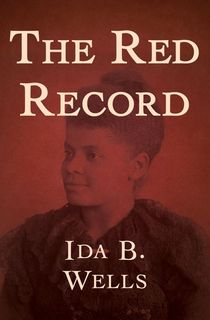
The Red Record
While the members of McClure’s Magazine exposed exploitation and degradation in American cities, Ida B. Wells turned her investigative eye to a very different evil proliferating unchecked in the United States: lynching. In the post–Civil War American South, the murder and lynching of innocent Black Americans was all too common and went virtually unpunished by law enforcement. In 1892 alone, more than 200 Black Americans were lynched by white Americans, with alleged transgressions ranging from “attempted stock poisoning” to “insulting whites.”
In The Red Record, Wells combines objective research and statistics on the barbaric practice with vivid and shocking descriptions of actual lynchings, making it impossible for readers to ignore either the extent of the violent injustice perpetrated against Black Americans or the inhumanity of it. Like the abolitionists before her, Ida B. Wells used her powers of documentation to shame and shock a new generation of apathetic white Americans into sympathy and action.
This post is sponsored by Open Road Media. Thank you for supporting our partners, who make it possible for The Archive to continue publishing the history stories you love.

